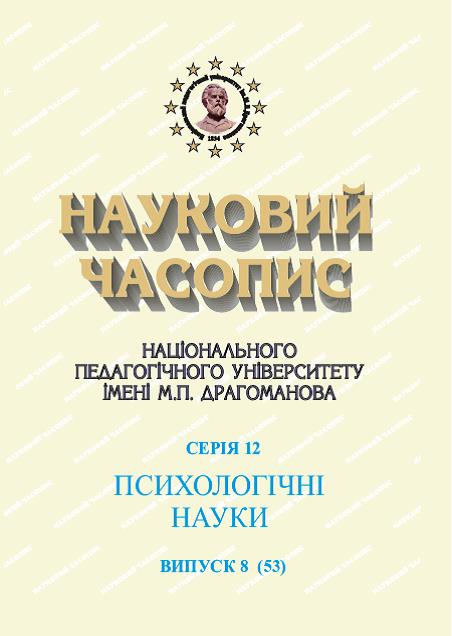PSYCHOLOGICAL PECULIARITIES OF EMPATHY DEVELOPMENT OF PARTICIPANTS IN SCHOOL LITERARY STUDIES
DOI:
https://doi.org/10.31392/NPU-nc.series12.2019.8(53).04Keywords:
empathy, literary ability, educational development environment, literary studioAbstract
The article is devoted to the analysis of school work with literary gifted children. The development of students’ literary abilities is ensured both by the learning process itself and is possible outside of school hours. It is found that a variety of literary centers have a greater focus on the development of students’ creative potential in literary activity: school literature circles and electives, city and regional literary circles and studios. Their main tasks and methods of working with literary gifted children are analyzed. More attention is paid to the peculiarities of developing the empathy of high school students engaged in literary activity. The early adolescence is characterized as a favorable period for the development of empathy. The article describes the essence of such psychological categories as: «empathy», «empathetic», «literary ability», «educational development environment», «literary studio». Diagnostic possibilities of methods of studying empathy in early adolescence are analyzed. It is established that the effectiveness of literary activity is provided by a certain empathic background. In turn, each level of development of literary abilities has its own predominant forms of empathic response, which provide «efficiency» of this level. The results of the empirical study of the features of the development of high school students’ empathy are described (its forms and levels of development, manifestations of empathic response to various objects of empathy), who are participants in school literary studies and who prefer to develop their literary abilities independently. It is empirically established that the inclusion of students in the literary and creative team promotes the development of their literary abilities. The development of empathy in early adolescence enables literary gifted students to express their highest empathy through literary creativity.
References
- Zhuravlova, L.P. (2007). Psykholohiia empatii [Psychology of empathy]. Zhytomyr : Vyd-vo ZhDU im. I. Franka [in Ukrainian].
- Zhuravlova, L. (2010). Diahnostyka empatii ta yii form u pidlitkovomu ta yunatskomu vitsi [Diagnosis of empathy and its forms in adolescence and adolescence]. Naukovyi chasopys Natsionalnoho pedahohichnoho universytetu imeni M. P. Drahomanova. Seriia 12: Psykholohichni nauky – Scientific journal of the National Pedagogical Drahomanov University. Series 12: Psychological Sciences, 31(55), 154-161 [in Ukrainian].
- Zhuravlova, L., & Hrechukha, I. (2018). Doslidzhennia osoblyvostei rozvytku empatii v literaturno obdarovanykh starshoklasnykiv [Research of features of development of empathy in literary gifted high school students]. Science and Education a New Dimension. Pedagogy and Psychology, VI (73), 64-69. https://doi.org/10.31174/SEND-PP2018-175V173-15 [in Ukrainian].
- Il’in, E.P. (2001). Emotsii i chuvstva [Emotions and feelings]. Sankt-Peterburg : Piter [in Russian].
- Kovalenko, V.M. (2006). Poetychnyi herbarii: literaturno-tvorcha studiia [Poetic Herbarium: Literary and Creative Studio]. Cherkasy : Brama-Ukraina [in Ukrainian].
- Kostiuk, H.S. (1989). Navchalno-vykhovnyi protses i psykhichnyi rozvytok osobystosti [Educational process and mental development of the individual].M. Prokoliienko (Eds.). Kyiv : Rad. shkola [in Ukrainian].
- Semenova, R.O. (2012). Kontseptualni osnovy pobudovy osvitnoho seredovyshcha dlia obdarovanykh ditei ta molodi [Conceptual frameworks for building an educational environment for gifted children and young people]. In D. Maksymenko & R.O. Semenova (Eds.), Aktualni problemy psykholohii – Topical problems of psychology (T. 6/8, pр. 5-22). Zhytomyr : Vyd-vo ZhDU imeni Ivana Franka [in Ukrainian].
- Jusupov, I.M. (2002). Diagnostika urovnja polikommunikativnoj jempatii [Diagnostics of the level of multicommunicative empathy]. In P. Fetiskin, V. V. Kozlov & G. M. Manujlov (Eds.), Social’no-psihologicheskaja diagnostika razvitija lichnosti i malyh grupp – Socio-psychological diagnosis of the development of personality and small groups (pр. 153-156). Moscow : Izd-vo Instituta Psihoterapii [in Russian].
- Jagunkova, V.P. (1973). Formirovanie komponentov literaturnyh sposobnostej u shkol’nikov V klassa [The formation of the components of literary ability in students of grade 5]. In V.A. Kruteckij (Eds.), Voprosy psihologii sposobnostej. Sbornik statej – Questions of psychology of abilities. Digest of articles (pр. 175-214). Moscow : Pedagogika [in Russian].

